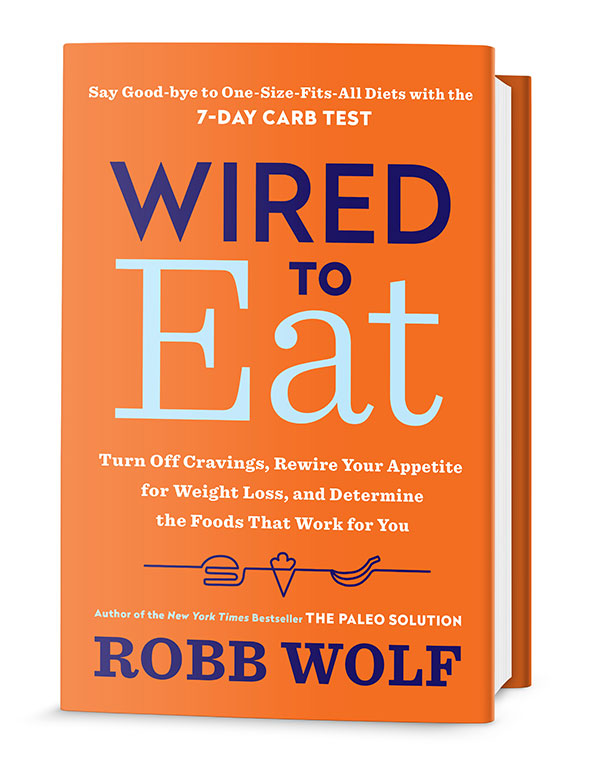In This Episode
Is it possible to have a nutrition plan that is customized *exactly* for your own individual needs?
Best selling author and former research biochemist Robb Wolf joins us to talk about the failings of one-size-fits-all diets, the neuroregulation of appetite, and much more.
TOPICS:
15:50 – Confirmation bias of self transformation stories & individual variation of insulin resistance
17:30 – The Wired To Eat template for tackling nutrition & health
20:00 – When nutrition and health guidelines turn into religious doctrine
22:20 – Controversy over the “cheat meal” or “cheat day” with long term progress
24:00 – The biological impact of cheat meals from a holistic point of view
26:40 – Supernormal stimuli: drugs, porn, and the planned cheat meal
29:45 – Abstainers vs moderators – alcoholism & food addiction
31:30 – Could excluding certain foods lead to neuroticism and disordered eating?
33:00 – Accidentally bypassing your neuroregulation of appetite? How to eat more – like a true Man vs Food champion
37:40 – Personalized Nutrition: What can we learn from continuous or periodic blood glucose monitoring?
40:20 – How to tweak your epigenetics to perform like (or better than) a genetic freak
42:50 – Calories or hormonal response to food – which is the most influential on your results?
46:20 – The psychology and morality of changing your diet
47:20 – How wealth and power doesn’t make eating healthy any easier
56:20 – Is your struggle with diet about food, or something “deeper”?
58:20 – How an ancestral or paleo diet could fit into your Personalized Nutrition journey
01:05:50 – High fat, low carb. Low fat, high carb. Which is for you? (There’s a test for that)
01:08:20 – Hammers, Drills and Ketosis: The Tools Your Doc May Never Use
1:13:20 – The 7 Day Carb Test, how to quantify which carbs work best for you
1:14:45 – Step by step testing your carbohydrate response with a blood glucose monitor
1:19:20 – A hypoglycemic response to at-home blood glucose carb testing, what it looks like
1:25:00 – Adjusting blood glucose carb response testing for petite or smaller individuals
1:31:20 – Hypochondria… is it all in your head… or perhaps your gut?
1:34:20 – Are exercise, social/community, and sleep actually more important than nutrition/diet?
Blood Glucose Testing
Ideal blood glucose range discussed in the episode at the 2 hour mark of 7 Day Carb Test:
- 90 to 115 mg/dl (primarily used in US-based measurements)
- 5 to 6.4 mmol/L (international standard for measurements)
Some of Jason’s 7 Day Carb Test results for 50g net carbs, blood glucose measured in mg/dl:
- Plain mix sweet potato (organic – purple, orange, white flesh)
- Fasted: 84
- 1 hour mark: 218
- 2 hour mark: 130
- Alyssa (Jason’s wife) – same medley for comparison
- Fasted: 83
- 2 hour mark: 110
- Retest sweet potatoes with half quantity on another day (25g net carbs)
- Fasted: 82
- 1 hour mark: 197
- 2 hour mark: 115
- Brown lentils (organic, from can, drained)
- Fasted: 90
- Hard to eat 50g net carbs of lentils by itself!
- 1 hour mark: 120
- 2 hour mark: 86
- Bananas
- Fasted: 88
- 1 hour mark: 125
- 2 hour mark: 80
- White rice (plain, soaked overnight, rinsed, cooked)
- Fasted: 89
- 1 hour mark: 144 (thirsty)
- 2 hour mark: 90
- Waffles (organic whole grains, gluten free, Caution: I do not eat waffles for breakfast, nor do I recommend others do so.)
- Fasted: 86
- 1 hour mark: 159
- 2 hour mark: 76
- Felt like candy in my mouth all morning and low energy throughout the day
*Note about the 7 Day Carb Test: This test is for learning more about yourself and shouldn’t be considered a template for a normal, ongoing eating pattern. I recommend listening to the podcast episode for more details, or even better read the book to make sure you understand how to use this test effectively.
Conversion chart from international units to US units from https://www.diabeteschart.org/mgmmol.html:
| mg/dl |
40 |
42 |
44 |
46 |
48 |
50 |
52 |
54 |
56 |
58 |
| mmol/L |
2.2 |
2.3 |
2.4 |
2.6 |
2.7 |
2.8 |
2.9 |
3.0 |
3.1 |
3.2 |
| mg/dl |
60 |
62 |
64 |
66 |
68 |
70 |
72 |
74 |
76 |
78 |
| mmol/L |
3.3 |
3.4 |
3.6 |
3.7 |
3.8 |
3.9 |
4.0 |
4.1 |
4.2 |
4.3 |
| mg/dl |
80 |
82 |
84 |
86 |
88 |
90 |
92 |
94 |
96 |
98 |
| mmol/L |
4.4 |
4.6 |
4.7 |
4.8 |
4.9 |
5.0 |
5.1 |
5.2 |
5.3 |
5.4 |
| mg/dl |
100 |
102 |
104 |
106 |
108 |
110 |
112 |
114 |
116 |
118 |
| mmol/L |
5.6 |
5.7 |
5.8 |
5.9 |
6.0 |
6.1 |
6.2 |
6.3 |
6.4 |
6.5 |
| mg/dl |
120 |
122 |
124 |
126 |
128 |
130 |
132 |
134 |
136 |
138 |
| mmol/L |
6.7 |
6.8 |
6.9 |
7.0 |
7.1 |
7.2 |
7.3 |
7.4 |
7.5 |
7.7 |
| mg/dl |
140 |
142 |
144 |
146 |
148 |
150 |
152 |
154 |
156 |
158 |
| mmol/L |
7.8 |
7.9 |
8.0 |
8.1 |
8.2 |
8.3 |
8.4 |
8.5 |
8.7 |
8.8 |
| mg/dl |
160 |
162 |
164 |
166 |
168 |
170 |
172 |
174 |
176 |
178 |
| mmol/L |
8.9 |
9.0 |
9.1 |
9.2 |
9.3 |
9.4 |
9.5 |
9.7 |
9.8 |
9.9 |
| mg/dl |
180 |
182 |
184 |
186 |
188 |
190 |
192 |
194 |
196 |
198 |
| mmol/L |
10.0 |
10.1 |
10.2 |
10.3 |
10.4 |
10.5 |
10.7 |
10.8 |
10.9 |
11.0 |
| mg/dl |
200 |
202 |
204 |
206 |
208 |
210 |
212 |
214 |
216 |
218 |
| mmol/L |
11.1 |
11.2 |
11.3 |
11.4 |
11.5 |
11.7 |
11.8 |
11.9 |
12.0 |
12.1 |
| mg/dl |
220 |
222 |
224 |
226 |
228 |
230 |
232 |
234 |
236 |
238 |
| mmol/L |
12.2 |
12.3 |
12.4 |
12.5 |
12.7 |
12.8 |
12.9 |
13.0 |
13.1 |
13.2 |
| mg/dl |
240 |
242 |
244 |
246 |
248 |
250 |
252 |
254 |
256 |
258 |
| mmol/L |
13.3 |
13.4 |
13.5 |
13.7 |
13.8 |
13.9 |
14.0 |
14.1 |
14.2 |
14.3 |
| mg/dl |
260 |
262 |
264 |
266 |
268 |
270 |
272 |
274 |
276 |
278 |
| mmol/L |
14.4 |
14.5 |
14.7 |
14.8 |
14.9 |
15.0 |
15.1 |
15.2 |
15.3 |
15.4 |






